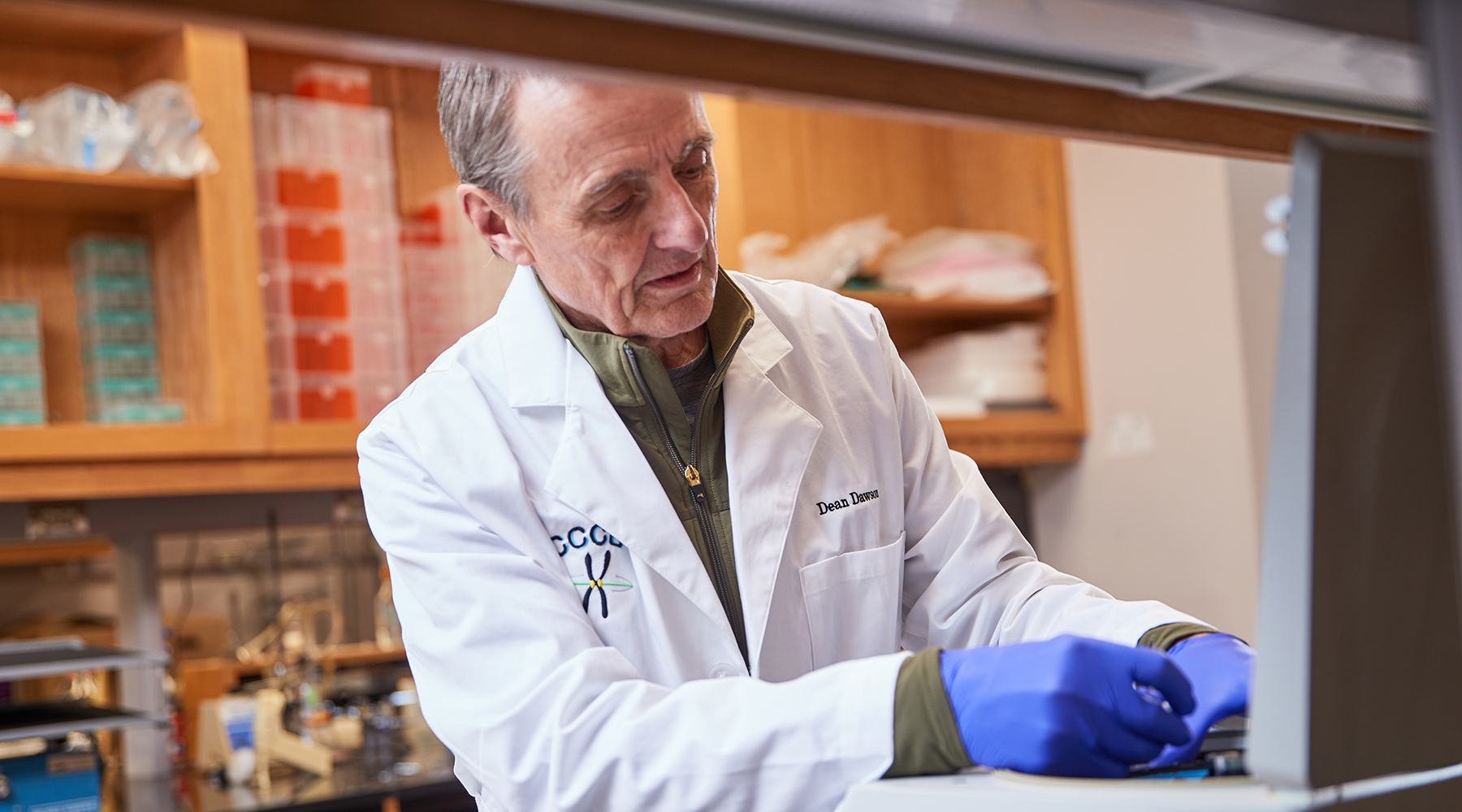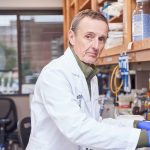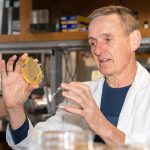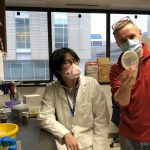Dean Dawson, Ph.D.
Professor
Cell Cycle & Cancer Biology Research Program
My 101
In my lab, we study chromosome behavior. We use yeast as a model for our studies, as yeast and humans use the same basic machinery, but the yeast system allows us to obtain data much more quickly. The information obtained from yeast studies can then be used to inform more directed studies in mammalian models, such as mice or human cell lines.
We currently focus our research on three problems. First, we have made much progress in recent years in elucidating the kinds of cellular components that are important for preventing errors in meiosis (the cell division process that produces gametes). Our findings reveal fundamental processes that, when they fail in humans, might be responsible for infertility and birth defects, such as Down syndrome. In this project, we are collaborating with our colleague Dr. Susannah Rankin. In a second project, we focus on what moves chromosomes when cells divide. One particular gene we study, MPS1, is critical for the survival of cancer cells. We are exploring details of its function in cancer cells as part of a collaboration with colleague Gary Gorbsky to better understand how it might be targeted to prevent tumor cell growth.
Research
The improper partitioning of chromosomes is responsible for a many human maladies. Errors in mitotic chromosome segregation contribute to the development of cancer while errors in meiosis are the leading cause of birth defects and infertility. Proper chromosome segregation requires the co-ordination of chromosome behavior with other cellular events, and the assembly of a functional machine to move the chromosomes to the right place at the right time in the cell cycle. The research in our laboratory is focused on both the regulatory and mechanical aspects of chromosome behavior. Our projects primarily use the yeast, Saccharomyces cerevisiae, as a model to elucidate conserved aspects of eukaryotic chromosome biology. Our goal is to elucidate fundamentals of chromosome behavior that will provide insights into the origins of chromosome segregation errors in humans.
Our laboratory is involved in two major projects. Slk19 is a bi-functional protein. Slk19 is a member of the FEAR signaling pathway that helps to co-ordinate the timing of cell cycle events from anaphase to cytokinesis. In the absence of a functional FEAR pathway mitotic cells experience delays in completing the cell cycle and meiotic cells produce highly aneuploid gametes. Slk19 is critical for transmitting the FEAR signal though how it participates is unclear. This question is one we are exploring. Slk19 may be related to the human TACC family proteins, which are implicated in certain cancers. TACC proteins participate in controlling mitotic spindle dynamics and this is true for Slk19 as well. It is this undefined role, separate from the FEAR pathway that appears to be shared among the TACC proteins. The manner in which Slk19 contributes to spindle function, and the consequences of failures in Slk19 activity are under investigation in my laboratory.
A second project in our laboratory explores the basis of chromosome segregation errors in meiosis. In meiosis I, chromosomes pair and recombine with their homologous partners, then segregate away from their partners at anaphase I. Most human birth defects (Down syndrome, for example) occur when a pair of homologs fails to segregate away from each other, instead moving to the same pole of the spindle at anaphase I. This failure of homologs to segregate away from each other is correlated with a failure to recombine. We have developed a yeast model system in which each yeast cell has one pair of non-recombined partners in every meiosis. This system has allowed us to describe the cellular processes that are used to correctly partition the error-prone chromosomes in most meioses. Most importantly we have discovered the centromere pairing plays a previously unrecognized role in mediating meiotic chromosome segregation. In addition, we have recently determined that the spindle checkpoint is especially important for the segregation of error-prone meiotic chromosomes and that the human spindle checkpoint protein, BubR1, can participate in this process in yeast. These results suggest testable molecular explanations for meiotic mis-segregation in humans. Future work will continue to explore the relationships of recombination, centromere pairing and the spindle checkpoint in mediating meiotic chromosome behavior.
Brief CV
Education
B.S., University of Wisconsin, 1978
Ph.D., University of Utah, 1984
Honors & Awards
Merrick Award for Outstanding Medical Research, 2012
Joined OMRF scientific staff in 2006
Publications
Recent Publications
Evatt JM, Sadli AD, Rapacz BK, Chuong HH, Meyer RE, Ridenour JB, Donczew R, Dawson DS. Centromere pairing enables correct segregation of meiotic chromosomes. Curr Biol, 2024 April, PMID: 38670094, PMCID: PMC11111343
Chuong HH, Evatt JM, Dawson DS. Dynamic Live Cell Imaging of Budding Yeast Meiosis. Methods Mol Biol 2818:161-169, 2024 January, PMID: 39126473
Meyer RE, Sartin A, Gish M, Harsha J, Wilkie E, Haworth D, LaVictoire R, Alberola I, Chuong HH, Gorbsky GJ, Dawson DS. Polyploid yeast are dependent on elevated levels of Mps1 for successful chromosome segregation. bioRxiv, 2023 January, PMID: 36712123, PMCID: PMC9882063
Selected Publications
Obeso D, Pezza RJ, Dawson D. Couples, pairs, and clusters: mechanisms and implications of centromere associations in meiosis. Chromosoma 123:43-55, 2013. PMID: 24126501 PMCID: PMC3969401
Havens KA, Gardner MK, Kamieniecki RJ, Dresser ME, Dawson DS. Slk19 of Saccharomyces cerevisiae regulates spindle dynamics through two independent mechanisms. Genetics 186:1247-1260, 2010. PMID: 20923975 PMCID: PMC2998308
Obeso D, Dawson DS. Temporal characterization of homology-independent centromere coupling in meiotic prophase. PLoS.ONE 5:e10336, 2010. PMID: 20428251 PMCID: PMC2859069
Gladstone MN, Obeso D, Chuong H, Dawson DS. The synaptonemal complex protein Zip1 promotes bi-orientation of centromeres at meiosis I. PLoS.Genet. 5:e1000771, 2009. PMID: 20011112 PMCID: PMC2781170
Stewart MN, Dawson DS. Changing partners: moving from non-homologous to homologous centromere pairing in meiosis. Trends Genet. 24:564-573, 2008. PMID: 18804891 PMCID: PMC2861281
Cheslock PS, Kemp BJ, Boumil RM, Dawson DS. The roles of MAD1, MAD2 and MAD3 in meiotic progression and the segregation of nonexchange chromosomes. Nat.Genet. 37:756-760, 2005. PMID: 15951820
Contact
Cell Cycle and Cancer Biology Research Program, MS 48
Oklahoma Medical Research Foundation
825 N.E. 13th Street
Oklahoma City, OK 73104
Phone: (405) 271-8192
Fax: (405) 271-7312
E-mail: Dean-Dawson@omrf.org
For media inquiries, please contact OMRF’s Office of Public Affairs at news@omrf.org.
Lab Staff
Asli Sadli, Ph.D.
Postdoctoral Scientist
Helen Hoa Chuong
Manager Laboratory
Olivia Bowles
Research Technician II
Bartosz Rapacz
Research Technician II
Anna Gierlikowska
Research Technician I
Jase Daugherty
Administrative Assistant III
Denna Mills
Administrative Assistant III
News from the Dawson lab
Four scientists from some of the nation’s leading research institutions have joined the faculty of the Oklahoma Medical Research Foundation. The new researchers bring additional strength to OMRF’s research in cancer, genetic disorders and immunology. Susannah Rankin, Ph.D., and Dean Dawson, Ph.D., come to OMRF from Boston, where Rankin studied cell division in the Systems […]












